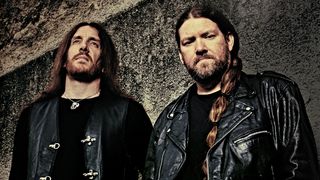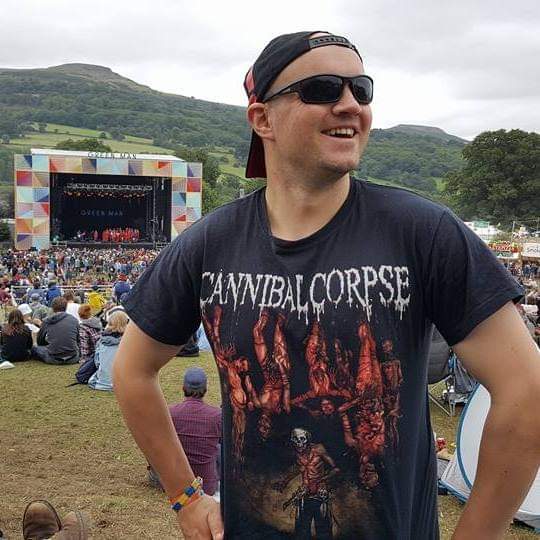The sounds, scope and attitude of black metal have inexorably been linked to the landscapes and surroundings of the movement’s creators. Nurturing the tales and lore that has formed much of its subject matter has given the musicians themselves a sense of wonderment and scale from which to draw breath.
Though initially taking their cues from Norway’s bands and bleak but beautiful scenery, German duo Imperium Dekadenz have forged a path and identity of their own, forming a deep connection with the ancient history, traditions and majesty of their native Black Forest.
In particular, it’s the Forest’s intrinsic bond with the Roman Empire that gives vocalist and guitarist Horaz and drummer Vespasian a wealth of inspiration to mine. The pair take their names from a Roman poet and Emperor respectively; Imperium Dekadenz is a quote from the 1979 film Caligula; and the title of the new album, Dis Manibvs, is an inscription used on Roman graves, meaning ‘Ghosts of death’ or ‘To the Gods’.
“The history of the Black Forest is a longing for something you can’t reach,” explains Horaz of his home’s captivating pull and rich history. “It’s almost like fantasy when you’re a child and you see a Roman bath and a fortress founded by Vespasian, so we imagined the Legions marching through the woods hunting the German tribes. The period is a mixture of darkness and brutality. It was an epic time.”
With subjects on the new album covering the destruction of Pompeii by the eruption of Vesuvius, Julius Caesar’s victory over Vercingetorix in Gaul, Constantine’s triumphant return from the Battle of the Milvian Bridge and even Horaz’s own explorations of the Circus Maximus and Palatine in the ancient city by night, the frontman claims a grander sound was also needed. Though the folkloric themes of 2013’s Meadows Of Nostalgia showed signs of evolution from the icy, traditional black metal palette the band had ploughed since their inception in 2004, there’s no doubting the grandeur and weight of Dis Manibvs, with songs like the title track and Vae Victis’s scope and rising tension propelling the music from mournful depths to transcendent altitudes, reminiscent of the more ambitious, progressive realms of post-black metal.
“Following on from Procella Vadens, which was our first album on Season Of Mist,” says Horaz, “we wanted the music to be more powerful, and on the new album we sought to be even more powerful still. We listened to bands like Mgła from Poland, and it made us realise didn’t want to do any more mid-tempo music. We spent a lot of time on the details of the changing of the parts and melodies so you always feel there’s another level to push forward.”
Horaz’s philosophy is indicative of the explosion of black metal bands sculpting limitless new forms from the well-trodden textures and sonic bombast of yore. As he is keen to stress throughout our conversation, a desire to push the band’s sound further on every release and remain incomparable to others is of paramount importance to Horaz.
“It’s very important not to copy yourself or the bands you listened to when you were young,” he says. “The Norwegian black metal sound is our biggest influence, but to leave an impression on the listener an artist must have the will to look for new horizons and create something new.”
Those searching for new horizons need look no further than the German black metal scene. While it might not have the same international clout as other well-known nations, Germany has still produced a wealth of bands such as Nargaroth, Lunar Aurora and Endstille, who stick to tried and tested hallmarks both musically and lyrically, but generally take the sound to a more epic, bombastic level.
“It’s epic and very raw – Germans love to pick up things and make things more extreme. We do sound like the Norwegian bands but more Wagner!” enthuses Horaz, while also pointing out that only in some cases have bands, including his own, broken free of the confrontational themes and images that black metal is known for, in order to achieve that most important of the genre’s traits: individualism.
“Lunar Aurora released an album about Bavaria and other bands have released music about the areas they’re from, but a lot of German bands still sing about evil, brutal stuff, looking and sounding like the classic Norwegian bands,” says Horaz. “But to produce art that’s focused on the devil or pagan gods is boring for us. We want to make music on subjects that are interesting for us: history and ecology, life and death, which are close to our hearts and personal lives.”
Though it might be easy to draw comparisons to other Germanic acts, the similar inspiration of Winterfylleth or the thriving post-black metal movement, Horaz is adamant about the strong sense of independence and identity he and Vespasian strive for in their music, openly admitting his limitations in order to prove the preservation of Imperium Decadenz’s authenticity.
“I never really learnt how to play guitar. I can’t play a single metal song, such as Metallica, or even the easiest children’s song. When I pick up my guitar I focus on songwriting, combining riffs I come up with to make a song. My style of playing guitar is absolutely free of any influence – I only play my own music. This is important for Imperium Decadenz, that it sounds different to other bands and is hard to compare it to anyone else, be it the sound, melodies, topics or even graphics.”
It’s not just the more unrestricted sounds and organic evolution of the black metal blueprint to new realms that makes
Dis Manibvs such a startling, engrossing listen, with final track Seikilos taking the notion of arcane, ancient influence to
a new level. Using the melody written down on the Seikilos epitaph – a 2,000-year-old Greek stone engraved with the oldest-known musical composition – the song is a preternatural testament to the unique musical vision for which Imperium Decadenz endeavour, with its simple, repetitive lyric of ‘Death is certain, life is not’ a fitting mantra.
“It’s extremely important that we’re different, even if people don’t like listening to us because we’re not evil or brutal enough,” Horaz concludes. “We are as we are, and we will continue to make music that’s authentic.”
10 of the best black metal albums from the 2000s


